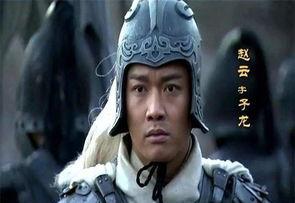If compared with the first-class warriors such as Guan Yu and Zhang Fei in the same biography, or the literary and artistic image of Zhao Yun in the "Romance of the Three Kingdoms", the historical Zhao Yun is naturally inferior.

Even if it is really "second-rate", there is nothing to be ashamed of. "Second-rate" does not mean low ability, just as failure to score ninety does not mean "scum".
Zhao Yun was able to protect the safety of Liu Chan and Lady Gan during the rebel army in Changshanpo:
"Romance of the Three Kingdoms, Biography of Zhao Yun": And the ancestor lord was chased by Cao Gong to Dangyang Changsaka, abandoned his wife and left south, and yun held a weak son, that is, the later lord, protected Lady Gan, that is, the queen master mother, all of which were spared.
Zhao Yun could also lead his troops alone to advance into Chengdu by water when fighting in Shu:
"Romance of the Three Kingdoms, Biography of Zhao Yun": To Jiangzhou, dispatch Yun from the outer water to Jiangyang, and meet Liang in Chengdu.
Zhao Yun was also able to resist Cao Zhen's army with suspects when Zhuge Liang was fighting, and "held on to the crowd" to prevent his own rout:
"Romance of the Three Kingdoms, Zhao Yun Biography": Next year, Liang went out of the army, and the voice was raised by The Xiegu Road, and Cao Zhen sent the public to deserve it. Liang Lingyun and Deng Zhi refused, and attacked Qishan. Yun and Zhi were weak and weak, and they lost to Migu, but they held on to the crowd and did not suffer a major defeat.
Even if we leave aside Pei's "Biography of Yun Bei", we can still find the characteristics of Zhao Yun from the brief writing of this biography: loyal and courageous, cautious, and have good military qualities.
Of course, Zhao Yun's identity as a "miscellaneous general" has always been criticized by history lovers, but the "miscellaneous general" does not represent the level of ability, just as the "reward and favor" Elk Zhu does not have a particularly outstanding talent:
"Romance of the Three Kingdoms, Biography of Elk Zhu": Bai (麋竺) is the general of An Han, and Ban is on the right side of the general of the military division. Zhu Grace Dunya, while Gan Fei is not the director. It is a courtesy to treat the guests above, and there is no command. The rewards are incomparable.
Looking at his life, Zhao Yun was deeply trusted by the monarch, loyal and brave, or died at an advanced age, and after his death, he was full of glory, what else did he want?
As a digression, let's talk about some of the questions about whether "The Tale of the Clouds" is credible.
Any historical material or any record can be questioned, so the act of "questioning whether the "Biography of the Cloud" is credible" itself is beyond reproach.
Whether there is a record of special beauty in the so-called "Biography of Yun Bei" is indeed something to be discussed when fully understanding and analyzing the historical data.
On the contrary, in the case of "not making a specific analysis of the corresponding historical materials", simply questioning the credibility of "Yun Bei Biography" on the grounds of "wild history" is a hooligan.
Historical books in the category of "correct history" may not be comprehensive and objective and rigorous, and historical materials that are in the category of "wild history" are not all empty.
The Huayang Guozhi, a work of Fang Zhi that belongs to the category of history and miscellaneous records, adds many historical details to Chen Zhi's Book of Shu in terms of history, geography, and characters. The deeds of liu Yin, a famous general of the Shu Han Dynasty, are not recorded in the Chronicle of the Three Kingdoms, but the Huayang Guozhi depicts it in detail and vividly:
"Huayang Guozhi": Liu Yin, the word Xiuran, Shu County, Chengdu people also ... Hidden straight and honest, thick in friendship, up to politics. "Huayang Guozhi" :(Liu Yin) counts from the great general Jiang Wei conquest, temporary design, when the enemy is trapped, brave champion... In the sixth year of Jing Yao, the Wei Zhenxi general Zhong would cut down Shu, enter the Han River, and besiege many times, but the hidden wall did not move. Will not attack it, can not be overcome.
And the "Book of Jin", which is ranked in the "Twenty-Four Histories", will inevitably have quite puzzling records such as "Sima Yi marched thousands of miles into Daba Mountain":
"Jin Shu Di Ji No. 1": Four years, the general of the Qian Dynasty, the governor of The Capital, the fake Huang Yu, and Cao Zhen cut shu. The emperor opened the road from the western city of Shushan, and the land and water went hand in hand, and rushed up, as for Shu Ren, he pulled out His Xinfeng County. Junci Dankou, in the rain, class division.
Therefore, there is no relationship between "the category of historical materials" and "the credibility of historical materials".
Watching "Zhao Yun was blown up by the Romance of the Three Kingdoms" gradually became "Zhao Yun was blown up by the "Tale of the Clouds", this can be said to be a kind of progress, but also a kind of sadness.